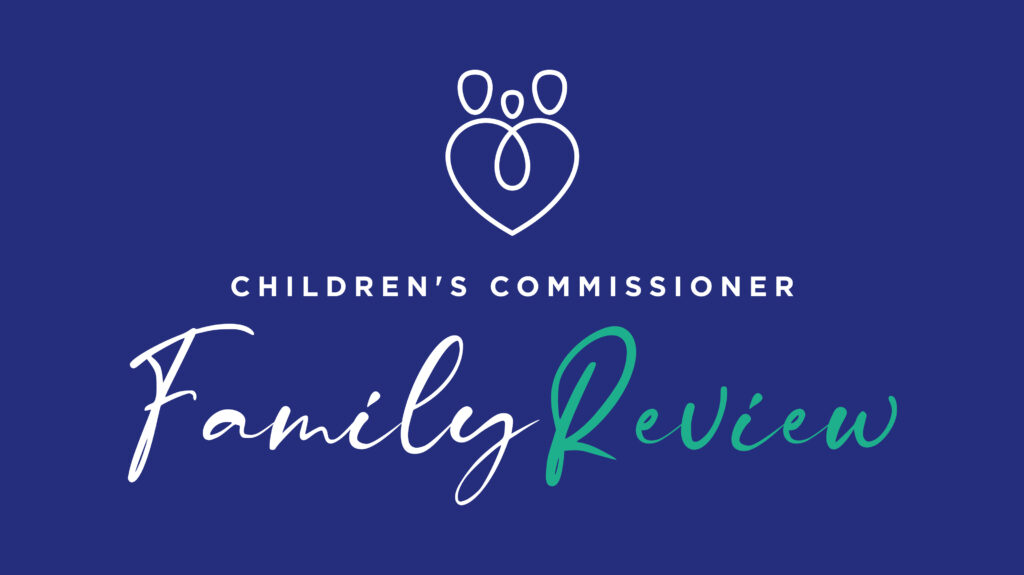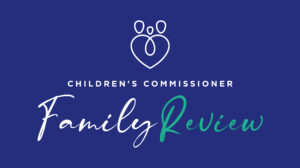
I am delighted to have been invited by the Minister of State at the Department for Levelling Up, Housing and Communities and Minister for Equalities to undertake an independent review into contemporary family life in Britain. This review was a recommendation of the Commission on Race and Ethnic Disparities, which found evidence that family life is a key factor in many of the disparities in children’s outcomes.
In April 2021, my office launched The Big Ask survey, which was a national consultation exercise with children in England to hear about their aspirations and worries for the future. We received over 550,000 responses, making this the largest ever survey of children in England. It was clear from their responses that children care greatly about their family, and they view the family as far-reaching and existing beyond the traditional nuclear unit.
The Big Ask showed that 80% of 9-17-year-olds and 95% of 6-8-year-olds were happy with their family lives. And, showed that one third of children said that having their own family was one of their top aspirations for their life when they grow up.
Children explained how having a supportive family has a really positive impact on their lives – from receiving emotional support, to being able to talk with family members about their worries and aspirations for the future:
‘My mum is amazing I’m so grateful for her. […] I love my family ‘ – Girl, 11
‘A loving family is worth more than money and will give you guidance support and love and advice’ – Boy, 11
‘I have very supportive parents who are always there for me. I can’t imagine going through school without them’ – Boy, 11
‘I have been very lucky to have grown up with a very supportive and a stable family environment with fantastic role models in my parents. As a result, they have shown me ambition and the importance of hard work and perseverance’ – Boy, 17
‘Getting mental health support is extremely difficult. […] However, I was very lucky and unlike a lot of people who struggle I managed to overcome the majority of my anxiety myself due to my parents being supportive’ – Girl, 16
Exploring the Contemporary Family Through the Family Review
It was great to hear from children directly about their family lives in The Big Ask. Children’s responses also highlighted how important the family is to children’s wellbeing, outlook, and aspirations. My office will work to understand more about children and parents’ perspectives about contemporary family life through the Family Review.
We will use quantitative and qualitative research to understand children and families’ perspectives on the support they are offered by public and voluntary services, and we will explore whether public services understand the needs of families as a unit, rather than as a collection of individuals. We look forward to working in partnership with others with expertise on families and family life as we conduct this Review. We will seek to understand whether the needs of children within families are understood in the provision of services to families, and we will investigate how we can improve children’s outcomes by improving the way public services understand the needs of families.
Alongside looking at what parents, children, and communities value in family life we will also look at some of the challenges they may face
We know from The Big Ask that children who were unhappy with their family life were 9 times more likely to be unhappy with their life overall, and 70% of these children were also unhappy with their mental health.
Children aged 6-8 often said they want to spend more quality time with their family. Many of these children want their parents to spend less time working away from home, so they can see them more frequently:
‘To have more days off to spend more time with my family ‘ – Girl, 7
‘Mummy and daddy to be with us more so kids don’t have to go to clubs all the time’– Boy, 6
‘I want my daddy to work less’ – Girl, 6
‘My dad to not be on his games and take care of me’ – Girl, 8
Some children expressed a desire for more positive relationships with family members:
‘Change my family so they can be nice to me’ – Boy, 6
‘My mummy not screaming at me’ – Girl, 6
‘The bullying in my family’ – Girl, 8
Some children highlighted how their families require more support or face particular challenges that make home life difficult for children. some children aged 9-17 wrote about their family being in financial difficulties. Aside from the immediate challenges this brings, children in these circumstances worry about the wellbeing of their family:
‘My mum is a single parent who hasn’t got a job and has 4 kids. We barely have enough money to stay in the house and get food and stuff to live. […] I’m worried about my mum and her mental health and to be honest I’m worried about mine’ – Girl, 10
‘My mum is a nurse and raising me and my brother and sister alone. She works so hard and gets no help. We go without a lot but we have a lot of love. […] Mum goes without food to feed us. She has two degrees from two universities! If she can’t manage then what kind of future will I have? […] If the government helped my mum a bit more she could help us more’ – Boy, 14
Looked after children
Some looked after children are very happy with their family life, and explained how much they value the love and support of their foster parents:
‘My foster carers work hard to help me and promote my relationship with my birth parents. Because of that I feel like I have more love than a normal child. It makes me feel stronger. […] I love my foster carers, they treat me like their own but still support me loving and accepting my parents. They do so much more than they have to and so much more than the other 4 foster parents I have had. I’ve told them I’m staying with them until I’m 25’ – Girl, 14, living in foster care
Although we did see some children in care asking for more support, children in care and young carers were twice as likely to be unhappy with their family life compared to other children:
‘I have an autistic sibling who I have to give constant attention for. […] My current status as an official young carer gives me more stress when this affects my time at school. And since this may carry on when I grow up, it may affect my future job in the future’ – Girl, 14, young carer
‘I feel like children in care are treated differently to people who live with their biological family. But we are the same as other young children’ – Girl, 14, living in foster care
‘If you are in care you don’t get treated the same. Even living in a family things are not the same as I have to ask permission from my Social Worker before I can do things’ – Boy, 11, living in foster care
In summary
This Review is a chance to really understand what family means to the nation, what they feel about family, what support is already in place and what more we can do. By doing this we can do more to create an environment to help all families and communities thrive. In completing this Review, I will go around the country to hear from all families, from every area and every background. I will be listening to communities and charities and I will make sure I capture the voice of the child, parents, carers, local services and communities in my work.
Find out more about Inclusive Britain: Government’s response to the Commission on Race and Ethnic Disparities.






